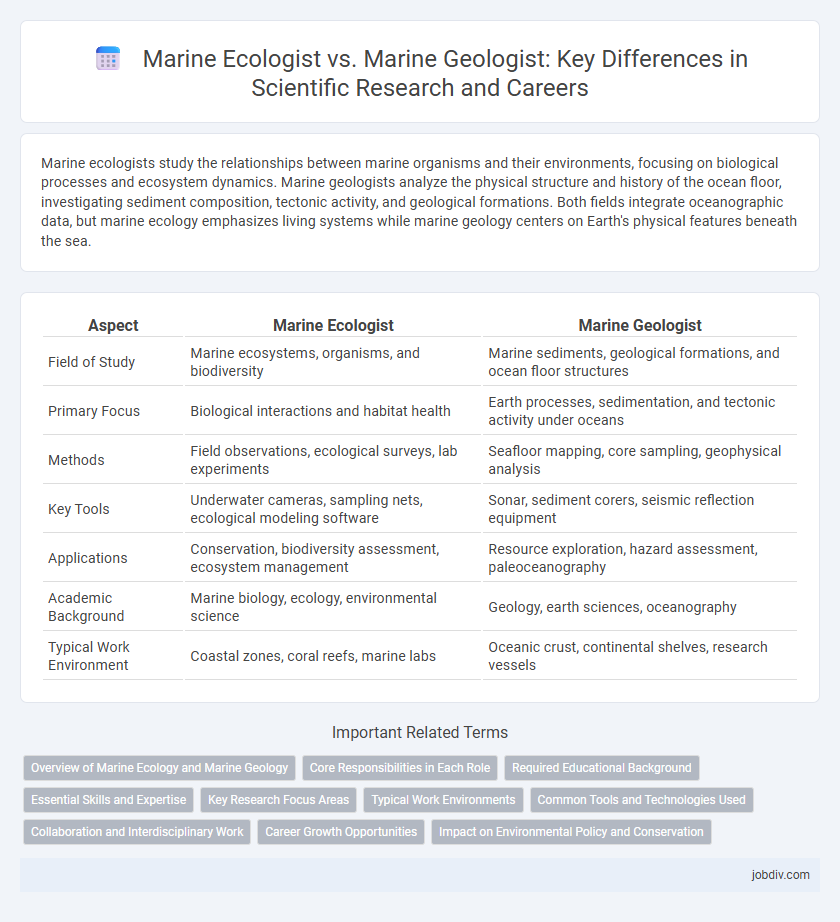Marine ecologists study the relationships between marine organisms and their environments, focusing on biological processes and ecosystem dynamics. Marine geologists analyze the physical structure and history of the ocean floor, investigating sediment composition, tectonic activity, and geological formations. Both fields integrate oceanographic data, but marine ecology emphasizes living systems while marine geology centers on Earth's physical features beneath the sea.
Table of Comparison
| Aspect | Marine Ecologist | Marine Geologist |
|---|---|---|
| Field of Study | Marine ecosystems, organisms, and biodiversity | Marine sediments, geological formations, and ocean floor structures |
| Primary Focus | Biological interactions and habitat health | Earth processes, sedimentation, and tectonic activity under oceans |
| Methods | Field observations, ecological surveys, lab experiments | Seafloor mapping, core sampling, geophysical analysis |
| Key Tools | Underwater cameras, sampling nets, ecological modeling software | Sonar, sediment corers, seismic reflection equipment |
| Applications | Conservation, biodiversity assessment, ecosystem management | Resource exploration, hazard assessment, paleoceanography |
| Academic Background | Marine biology, ecology, environmental science | Geology, earth sciences, oceanography |
| Typical Work Environment | Coastal zones, coral reefs, marine labs | Oceanic crust, continental shelves, research vessels |
Overview of Marine Ecology and Marine Geology
Marine ecology studies the interactions between marine organisms and their environments, emphasizing ecosystems, biodiversity, and the impact of human activities on ocean life. Marine geology examines the physical structure and composition of the ocean floor, including sedimentology, plate tectonics, and underwater geological processes. Both disciplines are essential for understanding ocean dynamics, with marine ecology focusing on biological systems and marine geology on geological formations.
Core Responsibilities in Each Role
Marine ecologists study the relationships between marine organisms and their environments, analyzing ecosystems, biodiversity, and the impacts of human activity on marine life. Marine geologists focus on the composition, structure, and processes of the ocean floor, including sediment dynamics, plate tectonics, and seafloor mapping. Core responsibilities of marine ecologists include field sampling, data analysis on marine species, and ecosystem modeling, while marine geologists primarily conduct geological surveys, sediment core sampling, and geophysical data interpretation.
Required Educational Background
Marine ecologists typically require a bachelor's degree in marine biology, ecology, or environmental science, often followed by a master's or Ph.D. specializing in marine ecosystems. Marine geologists usually hold degrees in geology, earth sciences, or marine geology with advanced studies focusing on seabed composition and tectonic processes. Both careers demand strong foundations in oceanography, but marine ecologists emphasize biological sciences while marine geologists prioritize geological and geophysical training.
Essential Skills and Expertise
Marine ecologists possess essential skills in biological data analysis, species interaction modeling, and ecosystem dynamics, enabling them to assess marine biodiversity and habitat health effectively. Marine geologists specialize in sedimentology, plate tectonics, and geophysical survey techniques, providing expertise in understanding seafloor structures and geological processes. Both roles require proficiency in field sampling methods and data interpretation, but their core expertise fundamentally differs between living systems and earth materials within marine environments.
Key Research Focus Areas
Marine ecologists primarily investigate the relationships between marine organisms and their environments, emphasizing ecosystems, biodiversity, and the effects of environmental changes on marine life. Marine geologists focus on the composition, structure, and processes of the seabed and coastal regions, studying sedimentology, plate tectonics, and underwater geological formations. Their research collectively enhances understanding of ocean dynamics, biodiversity patterns, and the impacts of natural and anthropogenic factors on marine habitats.
Typical Work Environments
Marine ecologists typically conduct research in coastal zones, estuaries, and coral reefs, often working aboard research vessels or in marine laboratories to study living organisms and ecosystems. Marine geologists primarily operate on offshore platforms, ocean drilling vessels, and coastal field sites, focusing on the physical structure, sediment deposits, and geological history of the seabed. Both professions require expertise in data collection through diving, remote sensing, and sampling methods in dynamic marine environments.
Common Tools and Technologies Used
Marine ecologists commonly use SCUBA gear, underwater cameras, and remote sensing technologies to study marine organisms and their habitats. Marine geologists rely on sonar mapping, sediment corers, and seismic reflection equipment to analyze seafloor structures and geological formations. Both specialists utilize GIS (Geographic Information Systems) to integrate spatial data for comprehensive marine environmental assessments.
Collaboration and Interdisciplinary Work
Marine ecologists and marine geologists collaborate extensively to understand coastal and oceanic systems by integrating biological and geological data. Combining ecological studies of marine organisms with geological analysis of seabed structures enhances insights into habitat formation, biodiversity patterns, and environmental change. This interdisciplinary approach drives advancements in marine conservation, resource management, and climate impact assessments.
Career Growth Opportunities
Marine ecologists experience career growth through expanding research opportunities in biodiversity conservation and ecosystem management, often advancing to roles in environmental consultancy and policy development. Marine geologists benefit from increasing demand in natural resource exploration and climate change studies, leading to prospects in academia, government agencies, and the energy sector. Both fields offer interdisciplinary collaboration and project leadership positions, with growth influenced by advancements in marine technology and data analysis.
Impact on Environmental Policy and Conservation
Marine ecologists specialize in studying the relationships between marine organisms and their environments, providing critical data on biodiversity and ecosystem health that directly influence environmental policies and conservation strategies. Marine geologists analyze seabed structures and sediment processes, supplying essential insights into marine habitat changes that inform sustainable resource management and environmental impact assessments. Both disciplines contribute uniquely to shaping policies that protect marine ecosystems, promoting conservation efforts grounded in comprehensive scientific understanding.
Marine Ecologist vs Marine Geologist Infographic

 jobdiv.com
jobdiv.com